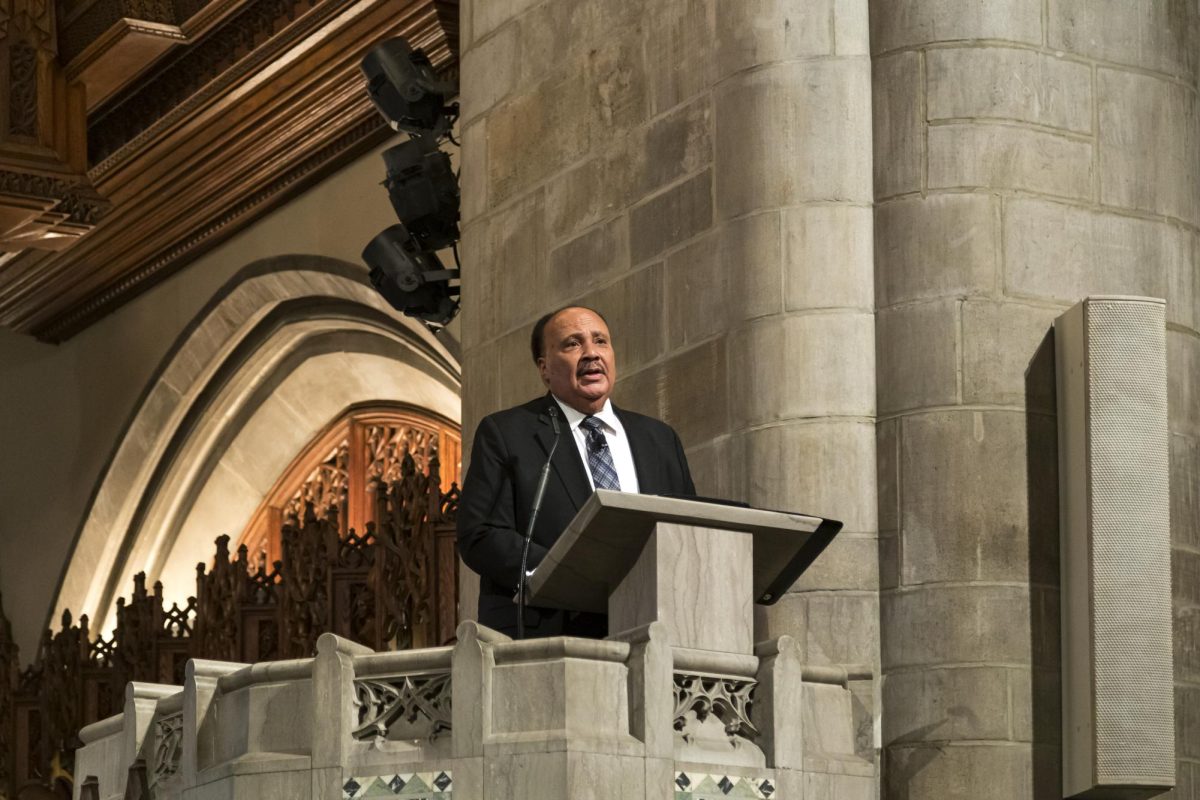Martin Luther King III delivered the keynote address during the University of Chicago’s 34th Annual Martin Luther King Jr. Commemoration, held January 30 at Rockefeller Memorial Chapel. In his speech, King III addressed gun violence, voting rights, income inequality, and political activism, calling for an end to violence around the world.
Before a full audience, the commemoration commenced with a rendition of the hymn “Lift Every Voice and Sing”—often referred to as the “Black national anthem”—by Uniting Voices Chicago, formerly known as the Chicago Children’s Choir. University President Paul Alivisatos then spoke about the need to include diverse voices to accomplish the University’s mission of maintaining free and inquiring dialogue.
“Diversity is not just a complement to these principles but a true cornerstone… We are enriched by a diversity of experience,” Alivisatos said.
In recognizing King Jr.’s work and legacy, Alivisatos asserted that the University is duty-bound to help fulfill the society he envisioned.
“We are called as an institution to further Dr. King’s vision,” Alivisatos said.
After Alivisatos’s speech, King III, the oldest son of King Jr. and Coretta Scott King, was called to the stage. A lifelong activist, King III has followed in his father’s footsteps in fighting for civil and voting rights. He has led events and protests across the nation commemorating his father’s legacy and opposing racial injustices. As recently as mid-January, King III launched a community service initiative called “Realizing the Dream” in collaboration with the NFL, aiming to achieve 100 million community service hours before his father’s 100th birthday in 2029. “Realizing the Dream” is also the name of a nonprofit organization he founded in 2006 with a mission of commemorating King Jr.’s legacy.
During his life, King III made three addresses at the Rockefeller Chapel: in 1956, 1959, and 1966.
King III’s visit to the Chapel for the commemoration came at a particularly somber time for him. His younger brother Dexter passed away a week earlier from prostate cancer, and the day of the commemoration, January 30, marked the 18th anniversary of his mother’s passing. King mentioned his personal misfortune during his speech but explained that it would not stop him from sharing his father’s message in forums like the University. He recounted his family’s history of overcoming misfortune, describing how his mother continued to protest racial injustice in Memphis in the immediate aftermath of her husband’s assassination.
“I chose not to postpone my participation [in the commemoration] because both my mother and my brother want me to carry on and share my father’s message of sharing peace,” King III said.
King III addressed how working to change society for the better can be a grueling process, often attracting resistance.
“Every time there’s a perceived win, somehow there’s pushback, but that should not dissuade us from doing what is right,” he said. “Let’s never fall into the trap of discouragement because we don’t get what we want right away…. We have to be in it for the long haul.”
King reiterated and defended his father’s call for nonviolence in seeking to enact change. Pushing back against the viewpoint that achieving change through nonviolence is too “utopian,” he pointed out that “ending segregation” and “having a Black president” were also once seen as utopian. He then turned his focus to the men in the audience, urging them to welcome and support the greater participation of women in society and the workforce.
“I want to appeal to all the men to stop fearing the rise of women in our society and do what we can to encourage our sisters to become leaders,” he said to applause from the audience. “We need their wisdom and peacemaking skills for humanity to survive.”
King then urged greater civility and open-mindedness when engaging in political dialogue with people of different views: “Let us always be courteous and respectful and good listeners and hear other people with an open mind and heart.”
Addressing the current state of the country, King protested its endemic gun violence and called for a ban on assault weapons. He also highlighted the country’s pervasive income inequality and the disconnect between its prosperity and the conditions of its poor. King expressed concern over recently passed measures in numerous states that have restricted the ease of voting, particularly impactful for minorities. He called on Congress to pass the John Lewis Voting Rights Act, which would reinforce provisions of the original Voting Rights Act his father advocated for. Despite the increasing hurdles to voting, King called on the audience, particularly the youth, to engage politically and vote.
“Take your love of country to the ballot box…. Let us make 2024 a year of energetic voter registration and education,” he said. Following his father’s advocacy for peace, King called on the country to urge for an end to deadly conflicts persisting around the world.
“Let’s call an end to the violence of Israel and Gaza and the violence in Sudan and the Congo and 28 other countries you don’t hear about,” he said amid applause.
In closing, King reemphasized the importance of taking a stand for what is right despite the costs and setbacks. “The ultimate measure of a human being is how one responds to the challenges of others. Sometimes we need to take positions that might not be popular or politic,” he said.









